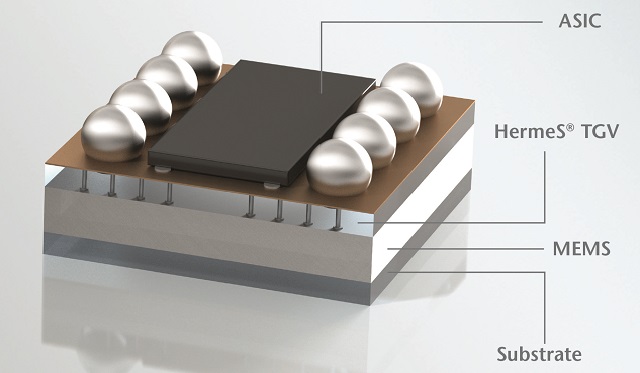Nov 20 2014
 Since HermeS® glass can be placed directly under the silicon MEMS, it makes miniaturized, fully hermetic 3-D wafer-level chip-size packaging (WLCSP) possible. Photo: SCHOTT.
Since HermeS® glass can be placed directly under the silicon MEMS, it makes miniaturized, fully hermetic 3-D wafer-level chip-size packaging (WLCSP) possible. Photo: SCHOTT.
SCHOTT, a global provider of specialty glasses and materials has expanded its product line with HermeS® wafers integrated with hermetically sealed, solid through glass vias (TGV) suitable for MEMS applications.
HermeS wafers are highly reliable, gas-tight substrates that facilitate robust MEMS enclosures for a long span of life. The vias have high electrical conductivity and an ability to regulate power supply to the MEMS device.
The silicon MEMS can be directly placed over the HermeS glass, enabling miniaturized, fully hermetic 3D wafer-level chip-size packaging. With these significances, HermeS substrates prove advantageous for MEMS device application in radio-frequency (RF), medical and industrial fields.
It is necessary for the MEMS devices such as pressure sensors to function for a long period of time under extreme environmental conditions. The robustness of the MEMS packaging technology determines the performance and reliability of the MEMS device.
SCHOTT’s HermeS wafers offer superior material characteristics over other silicon or ceramic substrates. Owing to the low dielectric constant and optical transparency of the glass, HermeS provides efficient quality control and processing characteristics required for the production of MEMS devices.
We are also able to apply state-of-the-art, wafer-scale bonding, such as anodic bonding with silicon, glass frit, and solder. Thanks to our vast competencies, our customers can rely on a complete packaged solution with a total cost-of-ownership advantage regarding yield and process reduction.
Yutaka Onezawa
Sales Manager for HermeS at SCHOTT Electronic Packaging
Three key applications of the HermeS TGV substrates are identified based on the characteristics of HermeS materials. HermeS glass wafers when used in industrial hermetic MEMS sensors deliver long-term, reliable, robust packaging of industrial sensors.
However, HermeS wafers in RF MEMS offer excellent RF properties in a miniaturized design. In terms of medical electronics, SCHOTT’s product ensures extremely rugged packaging to withstand sterilization cycles and body fluids for a long period of time.
Unlike traditional ceramic substrates, the carbon footprint of the HermeS substrate can be reduced by up to 80%. The glasses used in HermeS TGV substrates are of three types: D263®T eco borosilicate glass, AF32® eco alkali-free flat glass and BOROFLOAT® 33 floated borosilicate glass.
About SCHOTT
SCHOTT is an international technology group with 130 years of experience in the areas of specialty glasses and materials and advanced technologies. SCHOTT ranks number one in the world with many of its products.
Its core markets are the household appliance, pharmaceutical, electronics, optics, and transportation industries. The company is strongly committed to contributing to its customers’ success and making SCHOTT an important part of people’s lives with high-quality products and intelligent solutions. SCHOTT is committed to managing its business in a sustainable manner and supporting its employees, society and the environment.
The SCHOTT Group maintains close proximity to its customers with manufacturing and sales units in 35 countries. Its workforce of 15,400 employees generated worldwide sales of approximately $2.5 billion for the 2012/2013 fiscal year.